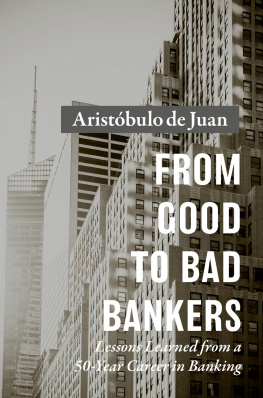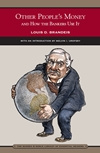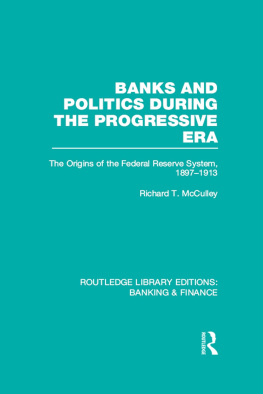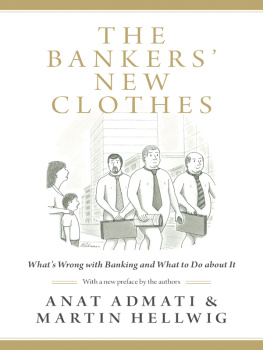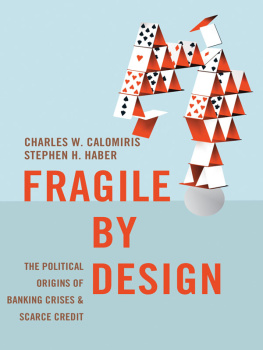Aristóbulo de Juan - From Good to Bad Bankers: Lessons Learned from a 50-Year Career in Banking
Here you can read online Aristóbulo de Juan - From Good to Bad Bankers: Lessons Learned from a 50-Year Career in Banking full text of the book (entire story) in english for free. Download pdf and epub, get meaning, cover and reviews about this ebook. year: 2019, publisher: Palgrave Macmillan, genre: Science. Description of the work, (preface) as well as reviews are available. Best literature library LitArk.com created for fans of good reading and offers a wide selection of genres:
Romance novel
Science fiction
Adventure
Detective
Science
History
Home and family
Prose
Art
Politics
Computer
Non-fiction
Religion
Business
Children
Humor
Choose a favorite category and find really read worthwhile books. Enjoy immersion in the world of imagination, feel the emotions of the characters or learn something new for yourself, make an fascinating discovery.
- Book:From Good to Bad Bankers: Lessons Learned from a 50-Year Career in Banking
- Author:
- Publisher:Palgrave Macmillan
- Genre:
- Year:2019
- Rating:3 / 5
- Favourites:Add to favourites
- Your mark:
- 60
- 1
- 2
- 3
- 4
- 5
From Good to Bad Bankers: Lessons Learned from a 50-Year Career in Banking: summary, description and annotation
We offer to read an annotation, description, summary or preface (depends on what the author of the book "From Good to Bad Bankers: Lessons Learned from a 50-Year Career in Banking" wrote himself). If you haven't found the necessary information about the book — write in the comments, we will try to find it.
From Good to Bad Bankers: Lessons Learned from a 50-Year Career in Banking — read online for free the complete book (whole text) full work
Below is the text of the book, divided by pages. System saving the place of the last page read, allows you to conveniently read the book "From Good to Bad Bankers: Lessons Learned from a 50-Year Career in Banking" online for free, without having to search again every time where you left off. Put a bookmark, and you can go to the page where you finished reading at any time.
Font size:
Interval:
Bookmark:
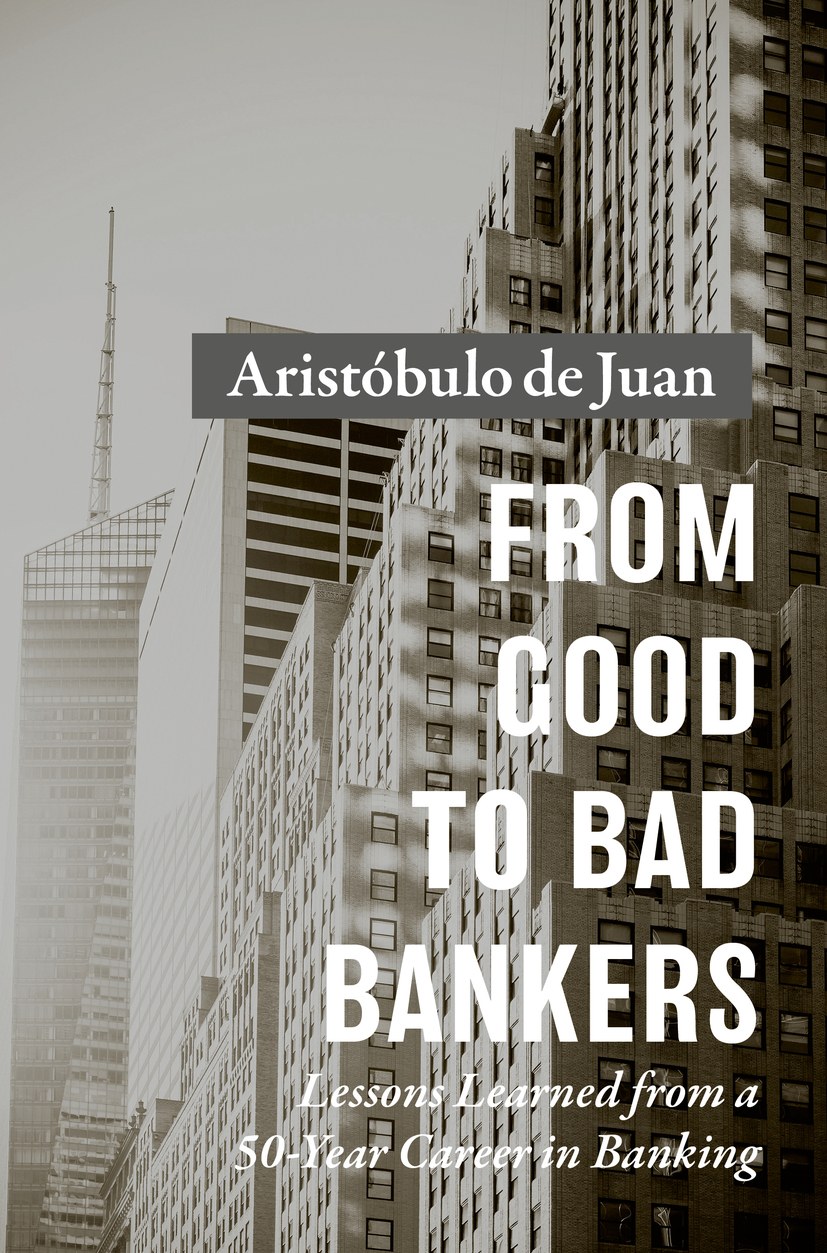

Cover credit MBPROJEKT_Maciej_Bledowski / iStock / Getty Images Plus
This Palgrave Macmillan imprint is published by the registered company Springer Nature Switzerland AG.
The registered company address is: Gewerbestrasse 11, 6330 Cham, Switzerland
I have no hesitation in recommending Aristbulos book From Good to Bad Bankers as mandatory reading for all regulators and supervisors anywhere in the world. The book is full of pearls of wisdom based on years of hands-on experience and problem solving in banking regulation and supervision. What is most remarkable about Aristbulo is his unwavering belief that good supervision is the essence of regulation. To quote him: While it is good that international regulators have focused strongly on boosting bank capital, less attention has been paid to supervision, asset evaluation and provisioning, which could prevent or reduce the number and size of crises, including their effective solutions. An analogy would be the focus on paying for a funeral rather than preventing the need for one in the first place. His view that on-site intensive and if necessary intrusive supervision to evaluate the banks asset value is absolutely true and is something supervisors should follow anywhere in the world. In emerging economies like India, the book has great relevance and being based on practical experience, supervisors in these countries will find they can relate to it. The style is easy to read and understand and this is a big bonus for these countries.
Usha Thorat, former Deputy Governor of the Reserve Bank of India
Bank regulators, bankers, investors, students of banking and bank regulation, and anyone interested in finance: run, dont walk, to get a copy of this book. With it, you get a seat at the table with one of the most experienced and wisest supervisors on the planet, and you get to learn some key lessons that will serve you well. The first chapter alone is worth the price and will help inoculate you against the viruses that at times run rampant in the financial world.
Jerry Caprio, William Brough Professor of Economics and Chair, Center for Development Economics, Williams College, USA
In the late 1980s, the World Bank began to review the lessons of financial development and discovered that commercial and policy-based banks were failing not just in the developing countries, but also in the advanced economies. More than 25 developing countries took action during the 1980s to restructure financial institutions that were distressed. Something was seriously wrong with development if the financial sector does not work properly. Accordingly, the Bank assembled a team under the leadership of then Chief Economist, Stan Fischer, to disseminate the news and to prepare the World Development Report 1989, which was devoted to the theme, Financial Systems and Development.
The Report was prepared by Millard Long, the Division Chief in Financial Policy and Systems Division of the Research Department, with a team that included Yoon Je Cho, Dimitri Vittas and Barbara Kafka. As part of the preparatory work, research projects and seminars were held to draw experience from all over the world. I was lucky to be hired in October 1989 as part of the Division to study bank failure and restructuring experience. Amongst the team already in place was Aristbulo de Juan, a distinguished banker from the Bank of Spain, who had deep understanding of bank insolvency and failure from both the commercial banking and supervisory sides. He led a fight against the then conventional wisdom of deregulation and consolidation as the panacea to solve banking crises. Instead, he strongly advocated for identifying and solving problems by mechanisms based on asset evaluation and real cash flows. He thus changed the World Bank approach to diagnose and treat problem systems and became very well-known at the Bank and in a variety of countries.
The 1989 Report was seminal because it revealed how financial crises have many causes, both micro and institutional and the result of policy mistakes, distorted interest rates and exchange rates, and political failure. The team that Millard Long led, aided by Alan Gelb (later Chief Economist, Africa), comprised some of the most illustrious thinkers and doers in the finance field. Millard himself went on to advise the financial sector reforms in Russia and Eastern Europe. Patrick Honohan became the Governor of the Bank of Ireland, using all that he learnt to turn around the Irish banking system in 20092015. Jerry Caprio went to Brown University, producing books on financial regulation and finance. Yoon Je Cho returned to Korea to advise several presidents and is today Korean Ambassador to the United States. Ross Levine led the work on why finance matters to growth and, later, why bad regulatory policies contributed to later crises. He is today at the University of California, Berkeley. Asli Demurgic-Kunt from Turkey is today Director of Research at the World Bank and helped build the financial development database set. Stan Fischer was to become Deputy Managing Director of the IMF, Governor of the Bank of Israel and Deputy Chairman of the Fed Board of Governors.
Working from different countries with different experiences, the intellectual atmosphere at that time was electric, with different people contributing to the huge debate on why finance matters. Much of the work produced at that time remains as important insights to the financial crises that unfolded in 1997 in Asia and ten years later in 2007.
Font size:
Interval:
Bookmark:
Similar books «From Good to Bad Bankers: Lessons Learned from a 50-Year Career in Banking»
Look at similar books to From Good to Bad Bankers: Lessons Learned from a 50-Year Career in Banking. We have selected literature similar in name and meaning in the hope of providing readers with more options to find new, interesting, not yet read works.
Discussion, reviews of the book From Good to Bad Bankers: Lessons Learned from a 50-Year Career in Banking and just readers' own opinions. Leave your comments, write what you think about the work, its meaning or the main characters. Specify what exactly you liked and what you didn't like, and why you think so.

